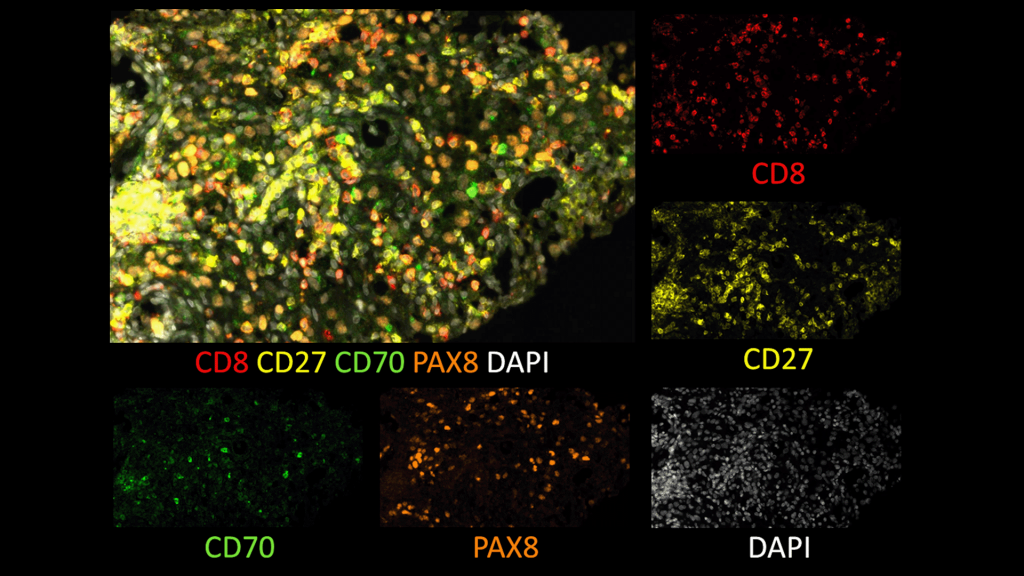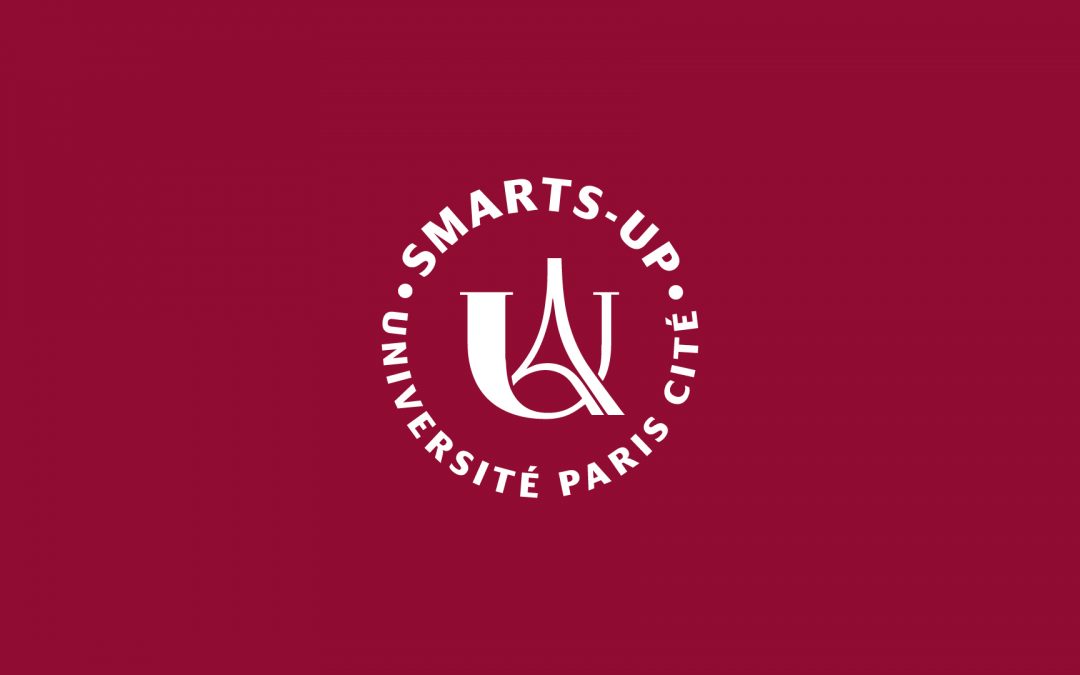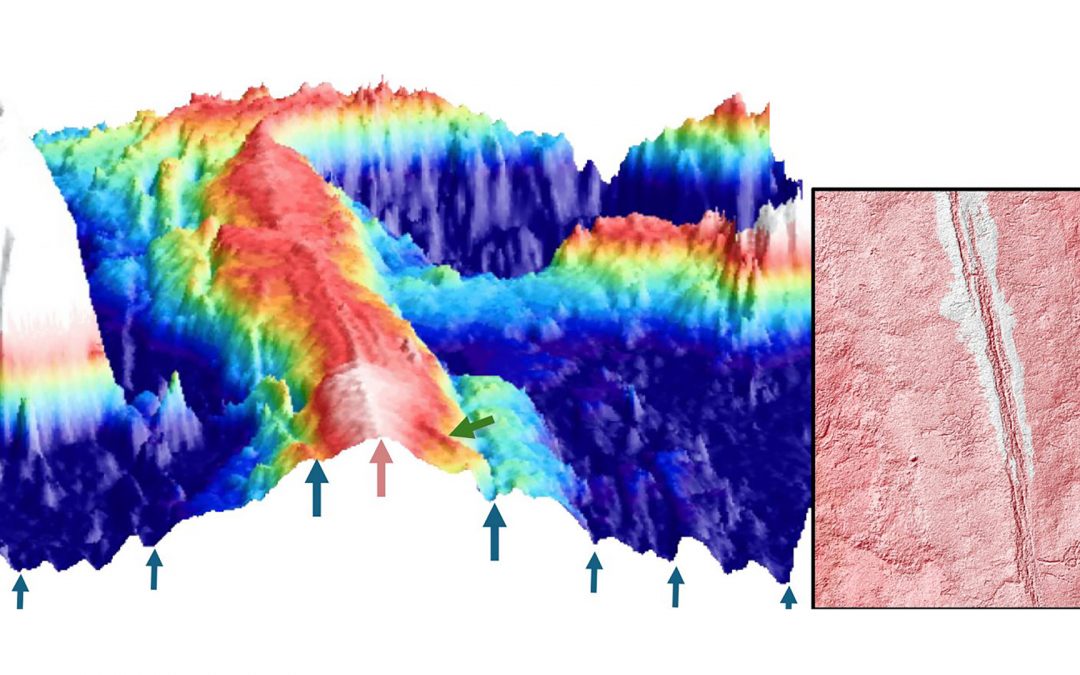Immunotherapy: Discovery of a Blood-soluble Biomarker advancing Customized Cancer Treatment

© Professor Eric Tartour – Université Paris Cité
Interaction between a tumor cell expressing CD70 and a T-CD27 lymphocyte from a biopsy of a kidney cancer patient.
In less than ten years, immunotherapy has significantly evolved to the point of being a therapeutic option in more than twenty different cancer indications. The research team led by Prof. Eric Tartour, at PARCC (UMR-S 970 Université Paris Cité, Inserm, Hôpital Européen Georges Pompidou – AP-HP), is carrying out research in immunotherapy on kidney cancer. In their recent findings, the team has demonstrated not only the existence of a mechanism that enables certain tumor cells derived from kidney cancer to survive immune system actions, but also the identification of a blood-soluble biomarker, CD27, characteristic of certain forms of cancer. This research was published in the journal Clinical Cancer Research and led to the filing of 3 patents.
Over the last ten years, research has led to major advancements in the field of immunotherapy [1] to the point that this type of treatment now completes the therapeutic arsenal available in oncology such as surgery, chemotherapy, radiotherapy and targeted therapy. As evidence, alone or associated with an anti-angiogenic treatment, immunotherapy is now the first choice treatment for kidney cancer. Today, several immunotherapy treatments are currently available for this cancer, however it remains essential to be able to customize the type of treatment by proposing the most appropriate one for each form of cancer. It is therefore crucial to thoroughly understand the tumor cell and its microenvironment, which is composed in part of immune cells. This involves the identification of one or more biomarkers (protein, gene, mutation in a gene, etc.) that are specific and thus characterizes each kind of cancer. Most biomarkers are identified from biopsies taken from the tumor, which is an invasive medical intervention. Prof. E. Tartour’s team has sought to identify biomarkers that can be detected in the blood through a simple blood test as early as possible in the course of the disease.
The team showed that, in the kidney tumor, the cancer cells were in contact with certain immune cells, which inhibited the function of the latter. Thus, constituted a mechanism of escape of the tumor from the immune system. The researchers demonstrated the expression in tumor cells of a molecule, CD70, which binds with a molecule, CD27, present on immune cells and particularly T lymphocytes. When this interaction takes place, the T lymphocytes die by apoptosis (cell death mechanism) and the immune system no longer has any effect on the tumor.
When the cells die, they release the CD27 molecule in soluble form into the bloodstream. Prof. E. Tartour’s team demonstrated a strong coorelation between the presence of soluble CD27 in the blood and the interaction between tumor cells and T lymphocytes. The study also demonstrated, retrospectively through the study of cohorts of tumor biopsies and human plasma, that the presence of high levels of soluble CD27 in the blood was associated with poor patient response to immunotherapy because their T cells, the targets of immunotherapy, died. These results, published in the journal Clinical Cancer Research, led to a first patent filing.
The team is now focusing on the upstream mechanism of interaction between CD27 and CD70, a deleterious interplay that causes the death of T lymphocytes and therefore inhibits the immune system. Why not try to inhibit this interaction by an adapted therapy? This is the key question behind their ongoing pre-clinical work, which has also led to a second patent filing.
Prof. E. Tartour is pleased that this translational research project with genuine clinical applications has been co-sponsored by Université Paris Cité and Inserm Transfer, enabling it to be funded by IdEx as part of Université Paris Cité’s “Pre-Maturation” call for expressions of interest (AMI). AMI is designed to support research stakeholders in their technology transfer and intellectual property projects with market value towards the socio-economic world. This research also received support of the “Cytometry andBiomarkers UtechS” platform of the Institut Pasteur.
The research and results already achieved could be of potential interest to other types of cancers whose tumors also display the CD70 molecule. Going forward, the team will work with an industrial company for the next clinical trials in order to proactively test the biomarker enabling to propose the most appropriate treatment for the patient depending on the form of cancer they develop.
[1] Immunotherapy consists of using various techniques to stimulate the patient’s immune system so that the body can defend itself and thus avoid, when possible, resorting to heavy treatments with significant side effects such as chemotherapy.
Sources
Plasma CD27, a surrogate of the intratumoral CD27-CD70 interaction, correlates with immunotherapy resistance in renal cell carcinoma
DOI : https://doi.org/10.1158/1078-0432.CCR-22-0905
Press contact
presse@u-paris.fr
-
Nadine Benhamouda, technician, in charge of the joint platform of the Georges Pompidou European Hospital (HEGP) and the Necker Hospital of the APHP and member of the “Immunotherapy and anti-angiogenic treatment in oncology” UMR-S 970 team (Université Paris Cité, Inserm, Georges Pompidou European Hospital – AP-HP). She received a grant from the Biophygen MISP.
-
Ikuan Sam, PhD student in the Immunotherapy and Anti-Angiogenic Treatment in Cancerology team UMR-S 970 (Université Paris Cité, Inserm, Hôpital Européen Georges Pompidou – AP-HP)
-
Stéphane Oudard, Head of the Medical Oncology Department at the HEGP and member of the “Immunotherapy and anti-angiogenic treatment in oncology” UMR-S 970 (Université Paris Cité, Inserm, Hôpital Européen Georges Pompidou – AP-HP)
-
Eric Tartour, PU-PH at Université Paris Cité, Director of the Immunotherapy and Anti-Angiogenic Treatment in Cancerology UMR-S 970 (Université Paris Cité, Inserm, Hôpital Européen Georges Pompidou – AP-HP) and Head of the Biological Immunology Department at Hôpital Européen Georges Pompidou and Hôpital Necker
Read more

Call for applications: SMARTS-UP Graduate Schools incoming mobility scholarships for master’s students
The SMARTS-UP Graduate Schools programme at Université Paris Cité aims to promote the internationalisation of Master's programmes and facilitate the admission of top international students, creating a pool of excellence for the recruitment of future PhD candidates....
read more![[SMARTS-UP Graduate Schools call for applications] Outgoing mobility scholarships for master’s students](https://u-paris.fr/wp-content/uploads/2021/04/SmartUP_1920-1080x675.jpg)
[SMARTS-UP Graduate Schools call for applications] Outgoing mobility scholarships for master’s students
The SMARTS-UP Graduate Schools programme at Université Paris Cité aims to promote the internationalisation of Master's programmes and facilitate the integration of top students into international organisations, creating a pool of excellence for the recruitment of...
read more
Evidence of magmatically induced faults at the East Pacific Rise
By comparison of ultra-high-resolution 3-D seismic imagery and bathymetry data collected at the East Pacific Rise (EPR) 9º50'N, researchers reveal the existence of magmatic induced faults near the ridge axis.
read more
Convergences: A Strategic Alliance paving the Future of Biology-Health Research
A key milestone for the partnership between Institut Pasteur and Université Paris Cité, the first “Convergences” scientific seminar took place on June 17th at the university’s head office at Odéon.
read more